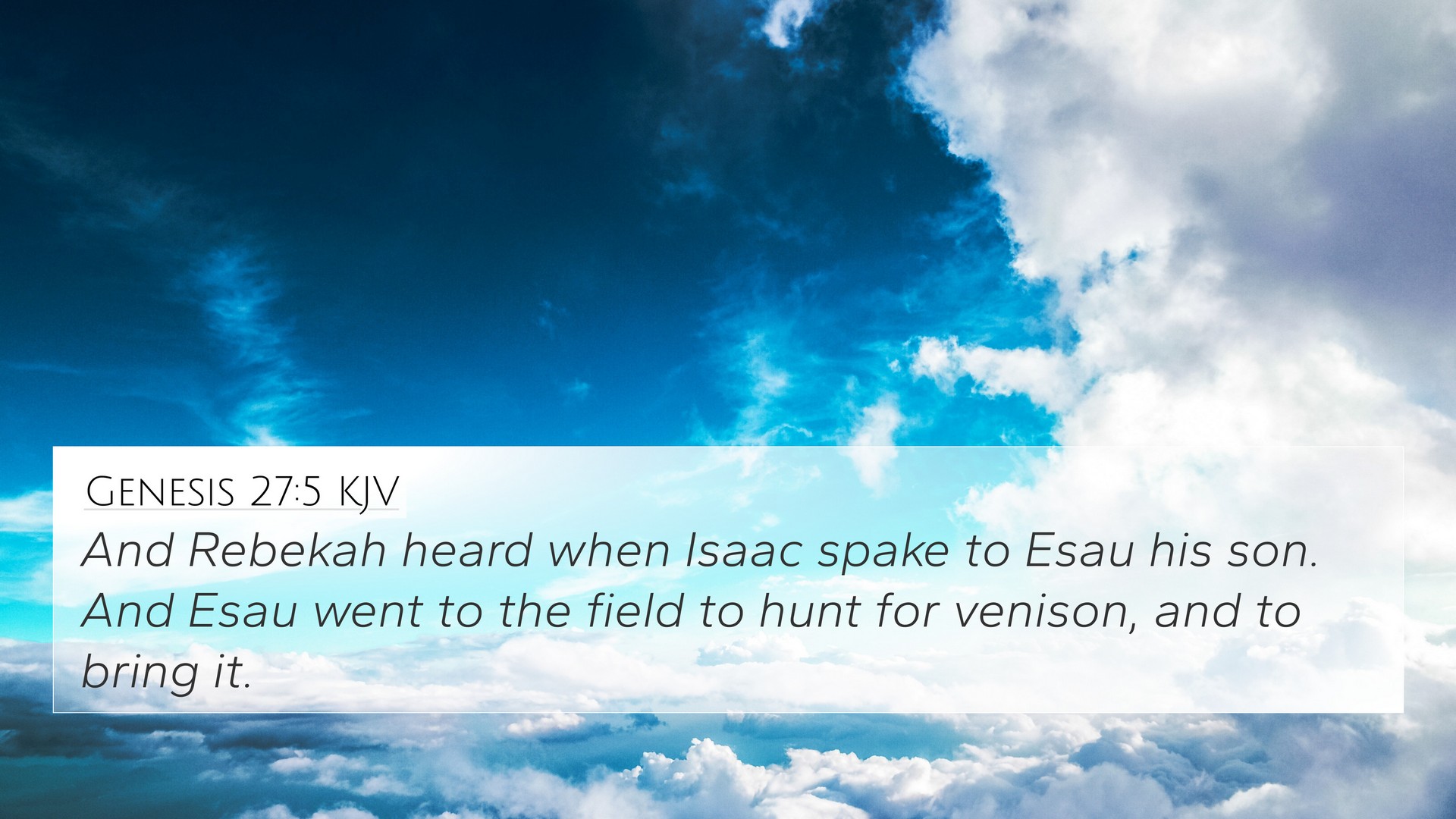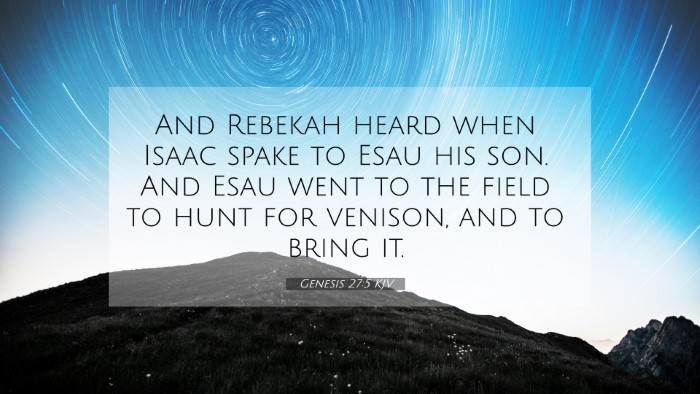Meaning and Interpretation of Genesis 27:5
Genesis 27:5 states, “And Rebekah heard when Isaac spake to Esau his son. And Esau went to the field to hunt for venison, and to bring it.” This verse is pivotal in understanding the dynamics of Rebekah, Isaac, and their sons Esau and Jacob. This summary combines insights from public domain commentaries by Matthew Henry, Albert Barnes, and Adam Clarke.
Context and Overview
This passage occurs in a broader narrative where Isaac prepares to give his blessing to Esau, the firstborn, which includes material and spiritual benefits. Rebekah, overhearing this conversation, devises a plan to ensure that Jacob, her favored son, receives the blessing instead. This creates a conflict that has significant ramifications for the family.
Key Themes and Insights
- Parental Favoritism: The tension between Isaac’s and Rebekah’s preferences for their sons draws attention to the role of favoritism in family dynamics. Matthew Henry comments on how this favoritism sets the stage for discord within the family.
- The Role of Deception: Rebekah’s actions highlight the theme of deceit. While her motives may be seen as protecting Jacob's rights, this leads to significant consequences, aligning with Albert Barnes’ notes on how manipulation ultimately brings strife to the family.
- Divine Prophecy: The background of this narrative includes God’s earlier prophecy to Rebekah that “the older shall serve the younger” (Genesis 25:23). Adam Clarke emphasizes that this sets the groundwork for the unfolding events, indicating God's sovereignty over human affairs.
- Human Agency vs. Divine Plan: The dynamics of this passage prompt readers to consider the balance between human actions and divine oversight. As noted by Henry, though Rebekah's intentions may appear commendable, they stem from a lack of trust in God’s timing.
- Cultural Significance of Blessings: The act of blessing carried deep cultural and spiritual significance in biblical times. The blessing would not only convey material wealth but also carry a divine promise. This insight connects to the larger biblical narrative regarding blessings and their implications for future generations.
Cross-References and Related Verses
Genesis 27:5 relates to several other Bible verses, illustrating the interconnectedness of Scripture:
- Genesis 25:23 - God’s prophecy about the twins, indicating the eventual servitude of the older to the younger.
- Genesis 27:8 - Rebekah instructs Jacob to follow her plan, demonstrating her active role in the deception.
- Genesis 27:18 - Jacob deceives Isaac, revealing the direct consequence of Rebekah’s overhearing Isaac’s words.
- Genesis 29:31 - God’s response to the dynamics of favoritism in family units.
- Hebrews 12:16-17 - A New Testament commentary on Esau’s loss of his birthright and blessing, illustrating the gravity of the situation.
- Malachi 1:2-3 - The prophetic narrative of Jacob and Esau, discussing God’s choice of Jacob over Esau.
- Romans 9:10-12 - Paul’s use of the narrative to illustrate God’s election and purposes.
- 1 Chronicles 5:1-2 - A reference that notes Jacob’s superiority over Esau in terms of blessings and inheritance.
Comparative Analysis
This verse prompts a comparative bible verse analysis, offering lessons about human behavior and divine providence. The theme of deception in the quest for a blessing is echoed in various narratives throughout the Scriptures. For example:
- Jacob and Rachel: Just as Jacob deceives his father, Rachel later deceives her father Laban (Genesis 31:19).
- The Israelites in Egypt: The theme of struggle for freedom parallels the struggle for a blessed inheritance.
Thematic Connections
Exploring thematic Bible verse connections reveals a transitional understanding of blessings and their rightful claim initially laid out in the Abrahamic covenant (Genesis 12:2-3). From the narratives of Genesis, one can delve into how biblical blessings influence not only immediate families but also shape the future nation of Israel.
Tools for Study and Cross-Referencing
To delve deeper into the connections and themes related to Genesis 27:5, one may use:
- Bible Concordance: A valuable resource for identifying related scriptures.
- Bible Cross-Reference Guide: Helps in linking Bible scriptures across different books.
- Cross-Reference Bible Study: Methods for conducting a thematic study, examining how different verses interact.
- Bible reference resources: Essential for comprehensive study and sermon preparation.
User Intent and Navigating Cross-References
Readers searching for understanding in Genesis 27:5 often seek answers to questions such as:
- What verses are related to Genesis 27:5?
- How do Genesis 27:5 and Genesis 25:23 connect?
- What are the similarities between the blessing of Jacob and the New Testament teachings on inheritance?
Conclusion
The events surrounding Genesis 27:5 are laden with family drama, deceit, and divine purpose, encapsulating vital themes in biblical narratives. By examining this verse, alongside its connections and implications, one can appreciate the complexity of God’s plan as revealed through Scripture. This passage serves as a starting point for a deeper exploration of how family dynamics reflect broader spiritual truths, all the while linking together various thematic elements through comprehensive Bible cross-referencing.


